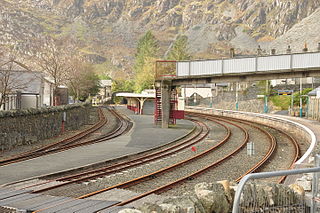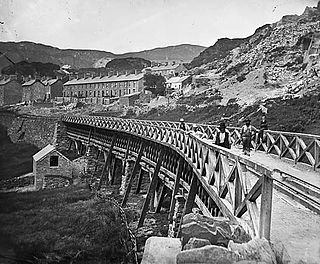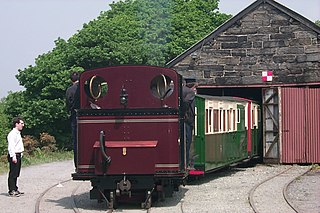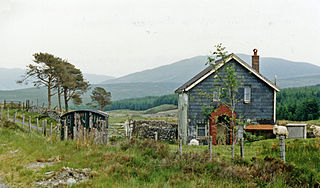
The Ffestiniog Railway is a heritage railway based on 1 ft 11+1⁄2 in narrow-gauge, located in Gwynedd, Wales. It is a major tourist attraction located mainly within the Snowdonia National Park.

Blaenau Ffestiniog is a town in Gwynedd, Wales. Once a slate mining centre in historic Merionethshire, it now relies much on tourists, drawn for instance to the Ffestiniog Railway and Llechwedd Slate Caverns. It reached a population of 12,000 at the peak development of the slate industry, but fell with the decline in demand for slate. The population of the community, including the nearby village Llan Ffestiniog, was 4,875 at the 2011 census: the fourth most populous in Gwynedd after Bangor, Caernarfon and Llandeiniolen. The population not including Llan is now only about 4,000.

The Conwy Valley line is a railway line in north-west Wales. It runs from Llandudno via Llandudno Junction to Blaenau Ffestiniog, and was originally part of the London and North Western Railway, being opened in stages to 1879. The primary purpose of the line was to carry slate from the Ffestiniog quarries to a specially built quay at Deganwy for export by sea. The line also provided goods facilities for the market town of Llanrwst, and via the extensive facilities at Betws-y-Coed on the London to Holyhead A5 turnpike road it served many isolated communities in Snowdonia and also the developing tourist industry. Although only a little over 27 miles (43 km) between Llandudno and Blaenau Ffestiniog, the journey takes over one hour, largely due to the sinuous and steeply graded nature of the route taken. Most of the stations along the line are treated as request stops.

Blaenau Ffestiniog railway station serves the slate mining town of Blaenau Ffestiniog, Wales, and is the passenger terminus of the Conwy Valley Line from Llandudno Junction. Transport for Wales Rail operate through services to Llandudno Junction and Llandudno. The station is a joint station with the narrow gauge Ffestiniog Railway, which operates primarily tourist passenger services to Porthmadog throughout most of the year. A feature of the standard gauge service is the availability on trains and buses of the popular "Gwynedd Red Rover" day ticket.

The Festiniog & Blaenau Railway (F&BR) was a narrow gauge railway built in 1868 to connect the town of Blaenau Ffestiniog in Wales with the slate quarries around Tanymanod and the village of Llan Ffestiniog, 3+1⁄2 miles (5.6 km) to the south. At Blaenau Ffestiniog it made a direct connection with the Festiniog Railway (FR) with which it was closely associated during its fifteen-year life. The railway was purchased by the Bala and Festiniog Railway in 1883 and converted to 4 ft 8+1⁄2 instandard gauge to extend the Bala Ffestiniog line, a branch of the GWR's line from Ruabon to Barmouth.

Boston Lodge Halt in North Wales is an unstaffed halt on the narrow gauge Ffestiniog Railway, which was built in 1836 to carry dressed slate from Blaenau Ffestiniog to Porthmadog for export by sea.
The Bala and Festiniog Railway was a 4 ft 8+1⁄2 in, standard gauge, railway backed by the Great Western Railway (GWR) in north-west Wales. It connected Bala with Blaenau Ffestiniog.

Maentwrog Road railway station was on the Great Western Railway's Bala Ffestiniog Line in Gwynedd, Wales.

Festiniog railway station served the village of Llan Ffestiniog, Gwynedd, Wales. This station was one of many 19th century institutions in Wales to be given an anglicised name. Over the years, and especially since the Second World War, most have been rendered into Welsh or given both Welsh and English names, but Festiniog station closed before this happened. The village of Llan Ffestiniog – known locally simply as "Llan" – lies over 3 km south of the larger and more recent Blaenau Ffestiniog, and over three miles south by rail.

Aneurin Bevan University Health Board (ABUHB) is the local health board of NHS Wales for Gwent, in the south-east of Wales. Headquartered in Caerleon, the local health board (LHB) was launched in October 2009 through the merger of Gwent Healthcare NHS Trust and Blaenau Gwent, Caerphilly, Newport, Torfaen, and Monmouthshire LHBs. It is named after Aneurin Bevan, a Member of Parliament who represented the area and who was the Minister of Health responsible for the foundation of the National Health Service. Aneurin Bevan University Health Board is the operational name of Aneurin Bevan Local Health Board.

Betsi Cadwaladr University Health Board (BCUHB) is the local health board of NHS Wales for the north of Wales. It is the largest health organisation in Wales, providing a full range of primary, community, mental health, and acute hospital services for a population of around 694,000 people across the six principal areas of north Wales as well as some parts of Mid Wales, Cheshire and Shropshire. Betsi Cadwaladr University Health Board is the operational name of Betsi Cadwaladr Local Health Board.
Llafar Halt was an unstaffed solely passenger railway station which served the rural area of Glanllafar, east of Trawsfynydd, Gwynedd, Wales.

Rhiwbach quarry was a slate quarry located to the east of Blaenau Ffestiniog in North Wales. The quarry was a remote site; it was nearly 4 miles (6.4 km) to north-east of Duffws, the Festiniog Railway's terminus in Blaenau Ffestiniog. It was the connected to the Ffestiniog Railway by the Rhiwbach Tramway. Commercial operation began around 1812, and it finally closed in 1952. It was the last Welsh slate quarry where workers lived in barracks on the site. 'Rhiwbach' is Welsh for 'Little Hill'.

Cwm Prysor Halt was a railway station which served the remote rural area of Cwm Prysor, east of Trawsfynydd, Gwynedd, Wales.
Glynllifon Street railway station was a temporary northern terminus station of the Festiniog and Blaenau Railway (F&BR), sited between the street of the same name and Cwmbowydd Road in Blaenau Ffestiniog. It was never named.

Duffws was the Festiniog Railway's (FR) second passenger station in Blaenau Ffestiniog, then in Merionethshire, now in Gwynedd, Wales. This station is not to be confused with the Festiniog and Blaenau Railway's (F&BR) Duffws (F&BR) station which stood some distance away on the opposite side of Church Street. During that station's life from 1868 to 1883 passengers travelling from (say) Festiniog on the F&BR to Tan-y-Bwlch on the Festiniog would walk between the two stations, much as passengers walk between the standard gauge and narrow gauge in modern-day Blaenau Ffestiniog.

On 10 September 1883, the Bala and Festiniog Railway (B&FR) and the Festiniog Railway (FR) opened what would be known as an interchange station in Blaenau Ffestiniog, Merionethshire, Wales. Merionethshire is now part of the county of Gwynedd.

North west Wales experienced a slate boom in the first half of the nineteenth century. Three sites stood out as experiencing the most explosive growth: Dinorwic near Llanberis, Penrhyn near Bethesda and Blaenau Ffestiniog.

Ysbyty Bron y Garth was a health facility in Penrhyndeudraeth, Gwynedd, Wales. It was managed by the Betsi Cadwaladr University Health Board.
Diphwys railway station was on the same site as the later Great Western Railway station in the heart of Blaenau Ffestiniog in what was then Merionethshire, now Gwynedd, Wales.

















